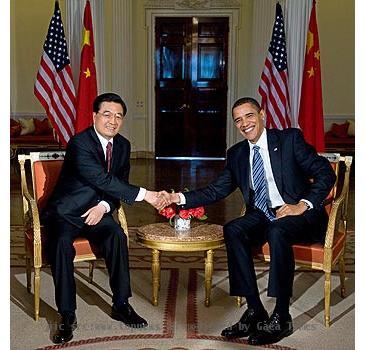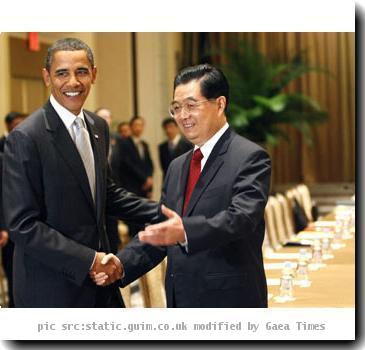Ahmadinejad visits Shanghai Expo after China’s about-face on Iran sanctions at UN
By Elaine Kurtenbach, APThursday, June 10, 2010
Iran leader in China after about-face on sanctions
SHANGHAI — Iranian President Mahmoud Ahmadinejad was visiting Shanghai to tour the World Expo and was expected to speak later Friday, two days after host China yielded to international pressure to back new nuclear sanctions against Tehran.
Ahmadinejad was not scheduled to meet with Chinese leaders while in China. He also skipped Thursday’s summit in Uzbekistan of the Shanghai Cooperation Organization, which was attended by Chinese president Hu Jintao. Iran is an observer in that group.
The new sanctions, agreed to Wednesday by the U.N. Security Council, seek to punish Iran for rejecting proposals to halt uranium enrichment and take its nuclear fuel from abroad. The West and its allies fear Iran is developing nuclear weapons, though Iran says it is seeking nuclear power only for peaceful energy and medical research purposes.
As a permanent member of the Security Council and key Iranian ally, China could have exercised its veto power to block the sanctions. But it reversed its earlier opposition out of frustration with Tehran’s intransigence and a desire to avoid becoming isolated over the issue, analysts said.
The U.N. resolution approved Wednesday targets Iran’s powerful Revolutionary Guard, ballistic missiles and nuclear-related investments in a bid to compel Tehran to cooperate with international inspectors.
“China’s vote for the sanction against Iran was a move to faithfully implement the conventions of the nuclear nonproliferation treaty,” said Gong Shaopeng, a professor with the Institute of International Relations at the Foreign Affairs University in Beijing.
During an official visit Wednesday to Tajikistan, Ahmadinejad displayed his usual disdain for efforts to rein in his country’s nuclear program, describing the latest U.N. measures as “annoying flies, like a used tissue.” The resolution “isn’t worth a cent for the Iranian nation,” he said.
China’s Foreign Ministry said Thursday its support for fresh sanctions should not block efforts to find a diplomatic solution, and called for renewed attempts to bring Iran back to the negotiating table.
“China has repeated on many occasions that the resolution adopted by the U.N. Security Council does not mean that the door to diplomatic efforts is closed,” said spokesman Qin Gang.
Details of negotiations with China over the sanctions are unknown. But Beijing appeared to be satisfied that the sanctions would not harm its economic ties with Iran, with whom bilateral trade reached at least $36.5 billion last year. Iran meets 11 percent of China’s energy needs and Chinese companies have major investments in Iranian energy extraction projects and the construction of roads, bridges and power plants.
It wasn’t clear what effect the vote would have on relations between Tehran and Beijing. Last month, Ahmadinejad rebuked Russia, which also backed sanctions, warning its leaders “to correct themselves, and not let the Iranian nation consider them among its enemies.”
“The vote may have a little impact on the Sino-Iranian relations, but Iran should believe there is difference between the policies of China and those of the U.S.,” Gong said.
Associated Press writer Christopher Bodeen in Beijing contributed to this report.
Tags: Asia, Beijing, China, East Asia, Foreign Policy, Greater China, Hu Jintao, Iran, Middle East, Shanghai, Tehran

